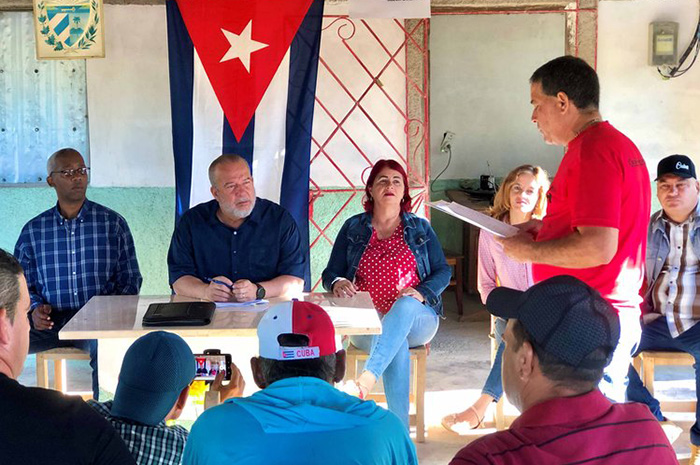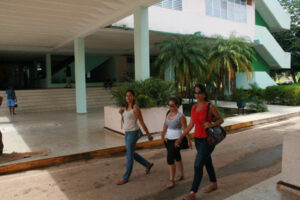Our main priority is to recover the National Electricity System, said Manuel Marrero Cruz, member of the Political Bureau and prime minister, who last Saturday toured communities and production centres in the municipality of Gibara in the province of Holguín, for which he is also a deputy to the National Assembly of People’s Power.
We are concentrating on continuing with the investments, especially in the photovoltaic parks to reduce the blackout, which will change the country’s economy and the lives of the population, he said. He commented that we will see the results little by little. «There is a strategy to improve the situation in the summer.
In this context, he confirmed that, at the same time, the communities, municipalities and provinces must continue to look for alternatives derived from their own potential.
When Marrero Cruz made these statements to the press who witnessed his day’s work, he had already visited the community of La Sirena, in the Floro Pérez popular council, where, together with local leaders and neighbours, he discussed the urgency of taking actions that can improve life there.
He said that an organoponic garden is a must in this place, as this type of establishment is one of the most economical structures for producing foodstuffs. «The beds of these facilities are made with rustic wood, and the plants used are from the area itself; water can be extracted from a nearby well, which can be applied with traditional watering cans, and after 30 days, harvests can be achieved. In addition, this generates jobs for people from the communities themselves.
The continuous ageing of the population, which at the national level is 25.7%, was also addressed by the Head of Government, who said that the situation of the elderly should be closely monitored, as should the situation of all those who have any problem of disability or vulnerability, so that they feel accompanied and cared for.
On the difficulties encountered by residents in rural areas when they have to travel to the municipal capitals to carry out certain formalities, which often involve a lot of bureaucracy, he said that, under the current conditions, given the lack of transport, it is necessary to do it the other way round, so that the officials of these institutions come to the settlements at least once a week.
He acknowledged that the municipality of Gibara has made progress in this direction, but urged the Gibara authorities present at the exchange not to be satisfied with what has been achieved, as there is still a long way to go towards what is desired.
‘We know that there are difficulties with medicines, but in the case of those who are insured with the card, we must do the same to reduce the journeys of those affected from the rural areas to the municipal capitals. Why not take the medicines from the card to the warehouses that exist in the communities,’ he reflected.
What has been done at the El Vapor grassroots business unit, which has a well-attended herd of 600 Siboney cattle, led him to praise the collective, many of whose members he asked questions to find out the reasons for their good results, even though they have the same problems and lack of resources suffered in the country’s livestock entities.
Once the ueb’s directors told him that they want more land to sustain their livestock, which is not being achieved, although there are areas nearby in usufruct that are not being fully exploited by those who exploit them, Marrero Cruz also suggested evaluating the situation, on the basis that the land should be in the hands of those who make the most of it and contribute the most to the people.
Visiting a tile factory of the provincial company of Materiales de la Construcción, he recognised the managers and workers for the creative way in which they deal with the lack of essential resources such as cement. There he saw how bricks and baked clay slabs are made, which has not prevented the execution of investments that required the use of blocks made with cement and gravel.
Precisely, taking into account the role of the directors of El Vapor and the Empresa de Materiales de la Construcción, he pointed out the change of mentality that is required in complex situations such as those we are experiencing, and the role of the cadres, because we have a people who want to move forward and understand the problems, but do not accept that those who head the workplaces, only engage in speeches and explanations.
«It is a reality that the US blockade exists, which is the main affliction to the country’s economy, but we must try to transform everything from the available resources and working conditions. That is why, in every workplace and community, if everyone has that mentality, it will change,» he said.
Convinced, he added: «We cannot allow collectives to lose heart for lack of a leader who is not capable. Our capacity must be directed at harnessing collective intelligence. During the tours, we must go and see the good experiences and check what is not being done well. Managers who are not willing to fight must be replaced.
He also called for an emphasis on popular control, which is the people’s way of defending their rights.
‘To protect their rights, the people have to join in the control, to make state institutions work efficiently,’ he said.




